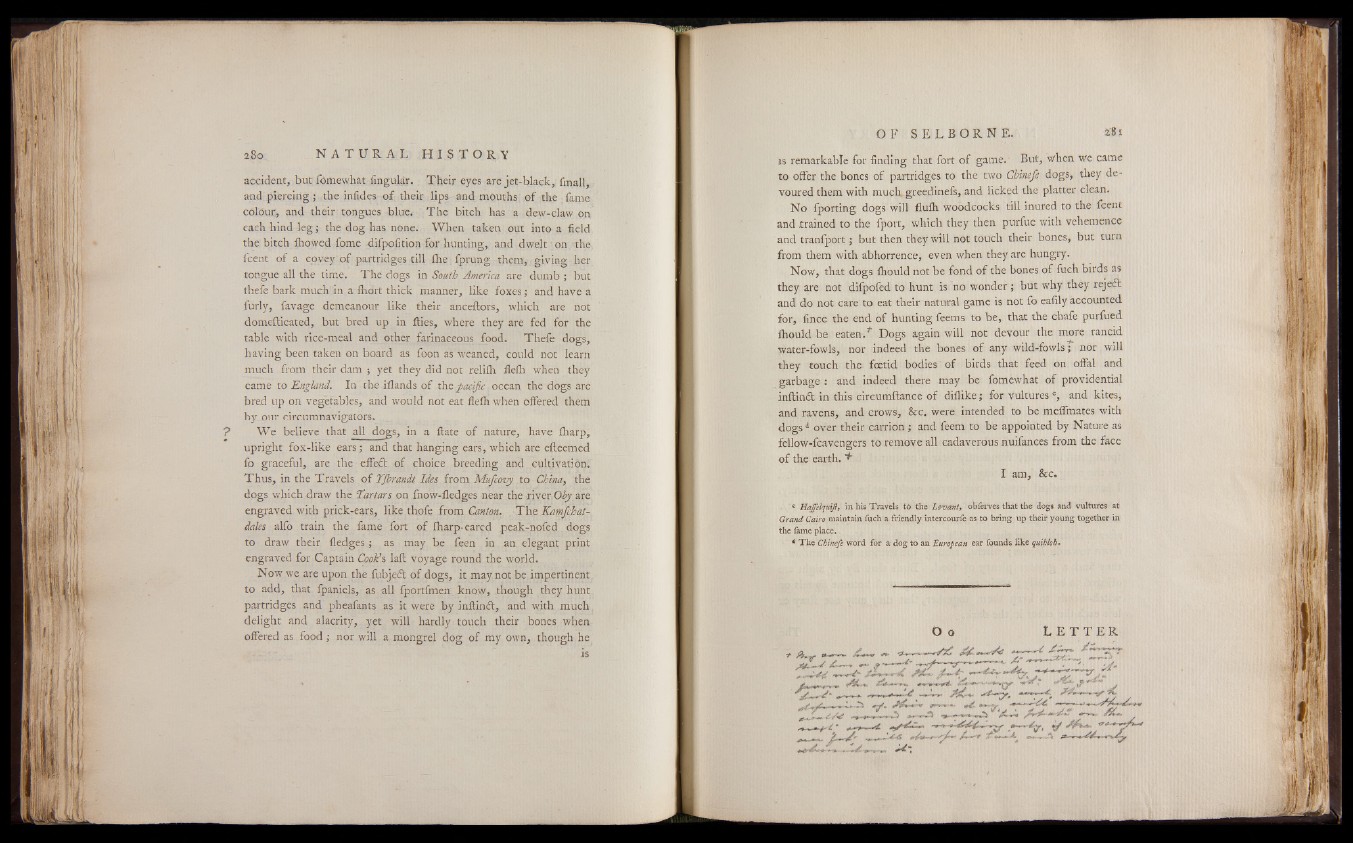
accident, but fomewhat lingular. Their eyes are jet-black, fmall,
and piercing; the infides-of their lips and mouths of the . fame
colour, and their tongues blue. The bitch has a dew-claw on
each hind leg; the dog has none. When taken out into a field
the bitch Ihowed fome difpofition for hunting, and dwelt ; on the
fcent of a covey of partridges till fhe fprung them, giving her
tongue all the time. The dogs in South America are dumb ; but
thefe bark much' in a flidrt thick manner, like foxes; and have a
furly, favage demeanour like their anceftors, which are not
domefticated, but bred up in flies, where they are fed for the
table with rice-meal and other farinaceous food. Thefe dogs,
having been taken on board as foon as weaned, could not learn
much from their dam ; yet they did not relilh flefh when they
came to England. In the iflands of the pacific ocean the dogs are
bred up on vegetables, and would not eat flefh when offered them
by our circumnavigators.
We believe that all dogs, in a ftate of nature, have lharp,
upright fox-like ears; and that hanging ears, which are efteemed
fo graceful, are the efieri: of choice breeding and cultivation.
Thus, in the Travels of YJbrandt Ides from Mufcovy to China, the
dogs which draw the Tartars on fnow-fledges near the river Ohy. are
engraved with prick-ears, like thofe from Canton. The Kamfchat-
dales alfo train the fame fort of lharp-eared peak-nofed dogs
to draw their fledges; as may be feen in an. elegant print
engraved for Captain Cook’s laft voyage round the world.
Now we are upon the fubjeri: of dogs, it may not be impertinent,
to add, that fpaniels, as all Iportfmen know, though they hunt
partridges and pheafants as it were by inftinft, and with much
delight and alacrity, yet will hardly touch their bones when
offered as food; nor will a mongrel dog of my own, though he
is remarkable for finding that fort of game. But, when we came
to offer the bones of partridges to the two Chinefe dogs, they devoured
them with much, greedinefs, and licked the platter clean.
No fporting dogs will flulh woodcocks till inured to the fcent
and .trained to the fport, which they then purfue with vehemence
and tranfport; but then they will not touch their bones, but turn
from them with abhorrence, even when they are hungry.
Now, that dogs fhould not be fond of the bones of fuch birds as
they are not difpofed to hunt is no wonder; but why they reject
and do not care to eat their natural game is not fo eafily accounted
for, fince the end of hunting feems to be, that the chafe purfued
Ihould be eaten.^ Dogs again will not devour the more rancid
water-fowls, nor indeed the bones of any wild-fowls; nor will
they touch the foetid bodies' of birds that feed on offal and
garbage ; and indeed there may be fomewhat of providential
inftinri: in this cireutnftance of diflike; for vultures c, and kites,
and ravens, and crows, &c. were intended to be mefimates with
dogs d over their carrion ; and feem to be appointed by Nature as
fellow-fcavengers to remove all cadaverous nuifances from the face
of the earth. *
I am, &c.
c Hajelquifl, in his Travels to the Levant, observes that the dogs and vultures at
Grand Cairo maintain fuch a friendly intercourfe as to bring up their young together in
the fame place.
* The Chinefe word for a dog to an European ear founds like quihioh.
L E T T E R
t* ■—>---^
tA ~
v .» i, *- - -Uvi ■■ - .